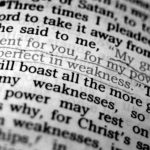Weariness brought them together.
The searing noontime heat made the dry and dusty road a walk of endurance.
The man stopped at the well and sat down. He was alone. His companions had gone ahead to the local market to buy food. He was tired and thirsty. It was good to rest.
Soon, a woman came along carrying a water bucket. She could have come earlier in the day, when it was cooler, but the women of Sychar knew her and she’d rather face the heat of the day than the glances and snickers of their scorn.
They detested her. She knew it. She knew why and she didn’t entirely blame them. It came with the territory of being who — and what — she was. To deny that would be to wallow in self-pity and that’s something she would not do. She would cling at least to that shred of dignity.
The man looked up at her, lifting his hand to his eyes for shade.
They were both thirsty, but she had the bucket. He smiled. Then he asked her for a drink.
The simple request triggered a profound awareness.
And some surprise.
Sign up for our weekly edition and get all our headlines in your inbox on Thursdays
“How is it,” the woman marveled, “that you, being a Jew, ask a drink from me, a Samaritan woman?” (John 4:9, emphasis added).
Somehow—we know not how—she knew he was a Jew. Jews didn’t have anything to do with “half-breed” Samaritans. And men didn’t have much regard for women.
A different kind of man
When was the last time a man treated her with kindness—or respect? Not that morning when she got out of bed. And Jews regarded Samaritans with nothing but contempt. No wonder this woman was surprised that Jesus would speak to her—and with such goodness in his voice.
Yes, he was different—very different.
And so began the dialogue most believers are familiar with.
The woman at the well understood the water literally. Jesus spoke of living springs gushing within the soul and leading to eternal life. Then the conversation got personal.
When the woman asked Jesus for “this water, that I thirst not,” he told her to go get her husband. She told him she had no husband. Perhaps she felt a painful sadness mixed with bitter remorse.
Jesus was getting close. Too close, she thought.
You’re right about that, Jesus replied. “The fact is, you have had five husbands, and the man you now have is not your husband” (John 4:18 NIV).
Jesus knew her. Soon she would know him.
Before this conversation was over, Jesus revealed his identity as the Messiah. And this woman—tattered and torn by life and her own miserable choices — believed.
It says she left her water bucket.
A miracle of love
Suddenly the well and the water didn’t matter anymore. What mattered is that this man knew all about her and still spoke words of kindness.
For her it was a miracle.
That’s what she told the villagers when she went running back to town. “Come see a man, which told me all things that ever I did: is this not the Christ?” (John 4:29 KJV).
The woman had nurtured her guilty despair for years, hidden in the deep recesses of her broken heart. Jesus saw her—not only as she was but for what she would become. His love healed her heart, set her free and saved her soul.
Her joyful testimony transformed her community—many believed.
But before she could love the Savior, this woman discovered how much he loved her. She had to know that first.
Jesus tells us loving God is the greatest commandment. The people of Israel were told to love the Lord their God with all their heart and with all their soul and with all their might (Deuteronomy 6:5). Jesus included our minds—and our neighbors.
We cannot love God like that—we cannot obey this greatest commandment—until first we are changed by God’s love for us. God is the Initiator of love and we are its receivers. Only after you and I have experienced God’s love for us—full, glorious and unconditional—can we begin to truly love God. Only then can we begin to keep the greatest commandment.
Only when Peter realized how much Jesus loved him—even after that horrible night of denials—did Peter love Christ enough to follow him to the cross.
David knew this experience too and wrote beautiful songs about it. His own love was enriched by the love and forgiveness of God.
The hardened heart that has not yet known God’s love cannot love. The heart touched by the love of God knows the joy of true love and it shows.
It is the love of God that makes it possible for us to accept and love ourselves, rightly and as we are, and then to love others as we ought.
“We love him because he first loved us” (I John 4:19).
An empty water bucket by a well reminds us.
Jack Wyman, a former preacher, pastor, community leader and politician, is the Director of Advancement & Donor Relations for Haggai International.














We seek to connect God’s story and God’s people around the world. To learn more about God’s story, click here.
Send comments and feedback to Eric Black, our editor. For comments to be published, please specify “letter to the editor.” Maximum length for publication is 300 words.